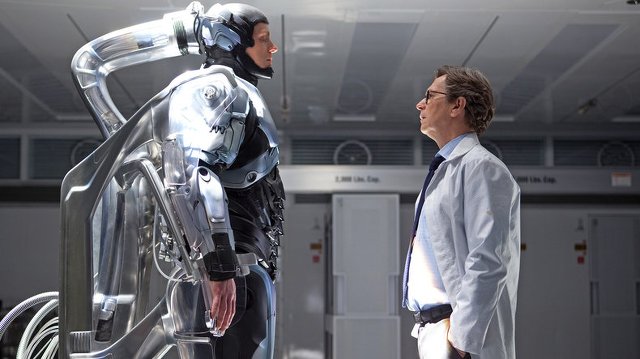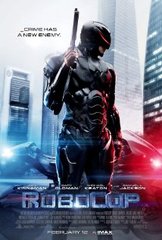 JOEL KINNAMAN AND GARY OLDMAN IN ROBOCOPThe mechanical encrusted on the living -- again
JOEL KINNAMAN AND GARY OLDMAN IN ROBOCOPThe mechanical encrusted on the living -- again The new 2014
RoboCop is a remake of the 1987 Paul Verhoeven film with some of the key elements changed. This new model lingers more on the human side, emphasizing how turning the wrecked body of the police protagonist into a glittering, powerful robotic policing machine, however cruel to its experimental subject or morally dubious in itself, also leaves behind a saddened wife and a troubled little boy. In place of the original film's sharp satire, intersperced throughout are sequences of Samuel L. Jackson dolled up in a
Hunger Games-style clotted toupee as a prancing Fox-style TV commentator called Pat Novak on his flashy show "The Novak Element." These provide emphatic yet perfunctory-feeling doses of heavy-handed political commentary to highlight the right's excessive love of dehumanized law and order. This unsubtle Greek chorus aside, the movie is filled with action, noise, and emotion and lacks Verhoeven's intelligence, cool ironies and subversive humor.
RoboCop 2 is naturally more high-tech, and is a big, expensive production ($100 million) with more of a name cast than the original, including Gary Oldman, Michael Keaton, Jacie Earle Haley, Abbie Cornish, Samuel L. Jackson, and a no-longer-nerdy Jay Baruchel, supporting Swedish up-and-comer Joel Kinnaman (of
Easy Money aka Snabba Cash, its lesser US remake, and the US TV series "The Killing"), who certainly has talent, but isn't as dashingly chilly as Peter Weller was in the lead in 1987. The new director, José Padilha, a Brazilian, is one whose work has been uneven -- the fine documentary
Bus 174 and the trashy
Elite Squad feature action series. He has never before directed an English-language film. Padilha clearly is neither as subversive nor as full of ideas as his predecessor. The screenplay he's working on, by Joshua Zetumer, keeps up the momentum, but lacks memorable lines or scenes.
RoboCop 2 starts off as loud and unpleasant as Neil Neill Blomkamp's recent
Elysium, and all the money spent just makes it look like a giant computer video combat game. But it does eventually drum up some sympathy through playing on the ordeal of Alex Murphy, the Detroit cop virtually killed in a car bombing in front of his house whose remaining stub of body is attached to an elaborate computerized kill machine exoskeleton. Murphy becomes essentially the property of the robot-producing company OmniCorp under the supervision of scientist Dr. Dennett Norton (Gary Oldman). Seemingly a cold tool of mechanistic science (cue Luddite disgust), Norton eventually turns into a sympathetic protector of his creation against the will of opportunistic company head Raymond Sellars (Keaton) and his macho, loose cannon mechanic Rick Mattox (Haley, having fun), who would de-commission their creation and kill off his/its human core. Meanwhile Alex's wife Clara (Cornish) and young son David (John Paul Ruttan) pine for him and fight against the amoral manipulations of OmniCorp, of which Clara becomes incrasingly aware.
No use is made of the fact that the city of Detroit where OmniCorp is located (though now its production lab is outsourced to China), in need of better law enforcement in 1987, has grown into a full-scaled urban disaster today, having declared bankruptcy in 2013 and declared it can no longer guarantee basic services to the population, including law enforcement. One can imagine how much truer to the location a low budget film shot in today's Detroit would have been. Padilha's Detroit just looks like any other city. (The only time when the movie gets an edgy real-world shock is an introductory section showing terrorized citizens in Tehran fleeing Tranformer-like giant robotic pacifiers.)
The purpose of creating RoboCop, as spelled out by Novak on his show, is to combat America's "robophobia" by offering a device that actually has a human inside, thus tempering the robot's cold, computerized efficiency with real human emotions. The trouble is, in the event, that his emotions slow the RoboCop Murphy down too much in apprehending wrongdoers, compared to pure robots. Mattox, in charge of arming and marshaling robot law enforcers, contemptuously calls the exoskeleton containing Murphy "Tin Man" and regards him as an "it" that's completely dispensable -- the sooner the better. For Dr. Norton, of course, this is far from being the case, because RoboCop is his pet project, his greatest accomplishment. Norton tries to keep RoboCop functioning acceptably by drastically reducing the capacity for sympathy and moral awareness in Murphy's brain. CEO Sellars, operating out of a chic board room decorated with a giant Francis Bacon triptych, is for whatever will profit OmniCorp and win public support. Novak meanwhile acts as a media shill for OmniCorp and favors Congress's voting down a recent law banning robot law enforcement. And RoboCop himself eventually proves to be unpredictable.
The most memorable image may be in the lab when we see what remains of Murphy -- a head and a sort of pulsating pulp and nothing more -- when the helmet and exoskeleton are removed. This sight worthy of Cronenberg or early David Lynch arouses a troubling mixture of disgust and pity, while also exposing how vague the science is in this sci-fi movie. But what counts is that this picture makes us aware how awkward and strange meet-ups between the RoboCop Murphy and his wife and kid are going to be; what a freak he is and what a strain on his little family's love it is to stay faithful to him. The most interesting, if both obvious and scientifically dubious, plot development is the way Murphy's moral and emotional awareness returns even after being, so to speak, surgically removed by Dr. Norton to make RoboCop effective while still nominally part human. The idea of a core of goodness and love that can't be eradicated is certainly a humanistic one, even though the movie's good guy-bad guy action and human interest appeal are its main motivating forces. A the end of the day, Verhoeven's reputation remains unchallenged.
RoboCop, 108 mins., opened wide in the US Wed., 14 Feb., 2014.






